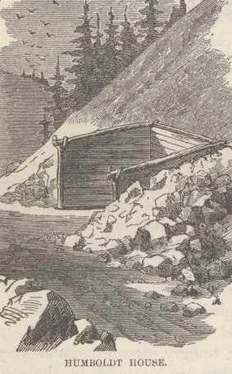Mark Twain - The Innocents Abroad
Здесь есть возможность читать онлайн «Mark Twain - The Innocents Abroad» весь текст электронной книги совершенно бесплатно (целиком полную версию без сокращений). В некоторых случаях можно слушать аудио, скачать через торрент в формате fb2 и присутствует краткое содержание. Год выпуска: 2004, Жанр: Классическая проза, Юмористическая проза, на английском языке. Описание произведения, (предисловие) а так же отзывы посетителей доступны на портале библиотеки ЛибКат.
- Название:The Innocents Abroad
- Автор:
- Жанр:
- Год:2004
- ISBN:нет данных
- Рейтинг книги:5 / 5. Голосов: 1
-
Избранное:Добавить в избранное
- Отзывы:
-
Ваша оценка:
- 100
- 1
- 2
- 3
- 4
- 5
The Innocents Abroad: краткое содержание, описание и аннотация
Предлагаем к чтению аннотацию, описание, краткое содержание или предисловие (зависит от того, что написал сам автор книги «The Innocents Abroad»). Если вы не нашли необходимую информацию о книге — напишите в комментариях, мы постараемся отыскать её.
The Innocents Abroad — читать онлайн бесплатно полную книгу (весь текст) целиком
Ниже представлен текст книги, разбитый по страницам. Система сохранения места последней прочитанной страницы, позволяет с удобством читать онлайн бесплатно книгу «The Innocents Abroad», без необходимости каждый раз заново искать на чём Вы остановились. Поставьте закладку, и сможете в любой момент перейти на страницу, на которой закончили чтение.
Интервал:
Закладка:
RETURN OF THE HOLY LAND EXCURSIONISTS—THE STORY OF THE CRUISE.
TO THE EDITOR OF THE HERALD:
The steamer Quaker City has accomplished at last her extraordinary voyage and returned to her old pier at the foot of Wall street. The expedition was a success in some respects, in some it was not. Originally it was advertised as a "pleasure excursion." Well, perhaps, it was a pleasure excursion, but certainly it did not look like one; certainly it did not act like one. Any body's and every body's notion of a pleasure excursion is that the parties to it will of a necessity be young and giddy and somewhat boisterous. They will dance a good deal, sing a good deal, make love, but sermonize very little. Any body's and every body's notion of a well conducted funeral is that there must be a hearse and a corpse, and chief mourners and mourners by courtesy, many old people, much solemnity, no levity, and a prayer and a sermon withal. Three-fourths of the Quaker City's passengers were between forty and seventy years of age! There was a picnic crowd for you! It may be supposed that the other fourth was composed of young girls. But it was not. It was chiefly composed of rusty old bachelors and a child of six years. Let us average the ages of the Quaker City's pilgrims and set the figure down as fifty years. Is any man insane enough to imagine that this picnic of patriarchs sang, made love, danced, laughed, told anecdotes, dealt in ungodly levity? In my experience they sinned little in these matters. No doubt it was presumed here at home that these frolicsome veterans laughed and sang and romped all day, and day after day, and kept up a noisy excitement from one end of the ship to the other; and that they played blind-man's buff or danced quadrilles and waltzes on moonlight evenings on the quarter-deck; and that at odd moments of unoccupied time they jotted a laconic item or two in the journals they opened on such an elaborate plan when they left home, and then skurried off to their whist and euchre labors under the cabin lamps. If these things were presumed, the presumption was at fault. The venerable excursionists were not gay and frisky. They played no blind-man's buff; they dealt not in whist; they shirked not the irksome journal, for alas! most of them were even writing books. They never romped, they talked but little, they never sang, save in the nightly prayer-meeting. The pleasure ship was a synagogue, and the pleasure trip was a funeral excursion without a corpse. (There is nothing exhilarating about a funeral excursion without a corpse.) A free, hearty laugh was a sound that was not heard oftener than once in seven days about those decks or in those cabins, and when it was heard it met with precious little sympathy. The excursionists danced, on three separate evenings, long, long ago, (it seems an age.) quadrilles, of a single set, made up of three ladies and five gentlemen, (the latter with handkerchiefs around their arms to signify their sex.) who timed their feet to the solemn wheezing of a melodeon; but even this melancholy orgie was voted to be sinful, and dancing was discontinued.
The pilgrims played dominoes when too much Josephus or Robinson's Holy Land Researches, or book-writing, made recreation necessary—for dominoes is about as mild and sinless a game as any in the world, perhaps, excepting always the ineffably insipid diversion they call croquet, which is a game where you don't pocket any balls and don't carom on any thing of any consequence, and when you are done nobody has to pay, and there are no refreshments to saw off, and, consequently, there isn't any satisfaction whatever about it—they played dominoes till they were rested, and then they blackguarded each other privately till prayer-time. When they were not seasick they were uncommonly prompt when the dinner-gong sounded. Such was our daily life on board the ship—solemnity, decorum, dinner, dominoes, devotions, slander. It was not lively enough for a pleasure trip; but if we had only had a corpse it would have made a noble funeral excursion. It is all over now; but when I look back, the idea of these venerable fossils skipping forth on a six months' picnic, seems exquisitely refreshing. The advertised title of the expedition—"The Grand Holy Land Pleasure Excursion"—was a misnomer. "The Grand Holy Land Funeral Procession" would have been better—much better.
Wherever we went, in Europe, Asia, or Africa, we made a sensation, and, I suppose I may add, created a famine. None of us had ever been any where before; we all hailed from the interior; travel was a wild novelty to us, and we conducted ourselves in accordance with the natural instincts that were in us, and trammeled ourselves with no ceremonies, no conventionalities. We always took care to make it understood that we were Americans—Americans! When we found that a good many foreigners had hardly ever heard of America, and that a good many more knew it only as a barbarous province away off somewhere, that had lately been at war with somebody, we pitied the ignorance of the Old World, but abated no jot of our importance. Many and many a simple community in the Eastern hemisphere will remember for years the incursion of the strange horde in the year of our Lord 1867, that called themselves Americans, and seemed to imagine in some unaccountable way that they had a right to be proud of it. We generally created a famine, partly because the coffee on the Quaker City was unendurable, and sometimes the more substantial fare was not strictly first class; and partly because one naturally tires of sitting long at the same board and eating from the same dishes.
The people of those foreign countries are very, very ignorant. They looked curiously at the costumes we had brought from the wilds of America. They observed that we talked loudly at table sometimes. They noticed that we looked out for expenses, and got what we conveniently could out of a franc, and wondered where in the mischief we came from. In Paris they just simply opened their eyes and stared when we spoke to them in French! We never did succeed in making those idiots understand their own language. One of our passengers said to a shopkeeper, in reference to a proposed return to buy a pair of gloves, "Allong restay trankeel—may be ve coom Moonday;" and would you believe it, that shopkeeper, a born Frenchman, had to ask what it was that had been said. Sometimes it seems to me, somehow, that there must be a difference between Parisian French and Quaker City French.
The people stared at us every where, and we stared at them. We generally made them feel rather small, too, before we got done with them, because we bore down on them with America's greatness until we crushed them. And yet we took kindly to the manners and customs, and especially to the fashions of the various people we visited. When we left the Azores, we wore awful capotes and used fine tooth combs—successfully. When we came back from Tangier, in Africa, we were topped with fezzes of the bloodiest hue, hung with tassels like an Indian's scalp-lock. In France and Spain we attracted some attention in these costumes. In Italy they naturally took us for distempered Garibaldians, and set a gunboat to look for any thing significant in our changes of uniform. We made Rome howl. We could have made any place howl when we had all our clothes on. We got no fresh raiment in Greece—they had but little there of any kind. But at Constantinople, how we turned out! Turbans, scimetars, fezzes, horse-pistols, tunics, sashes, baggy trowsers, yellow slippers—Oh, we were gorgeous! The illustrious dogs of Constantinople barked their under jaws off, and even then failed to do us justice. They are all dead by this time. They could not go through such a run of business as we gave them and survive.
And then we went to see the Emperor of Russia. We just called on him as comfortably as if we had known him a century or so, and when we had finished our visit we variegated ourselves with selections from Russian costumes and sailed away again more picturesque than ever. In Smyrna we picked up camel's hair shawls and other dressy things from Persia; but in Palestine—ah, in Palestine—our splendid career ended. They didn't wear any clothes there to speak of. We were satisfied, and stopped. We made no experiments. We did not try their costume. But we astonished the natives of that country. We astonished them with such eccentricities of dress as we could muster. We prowled through the Holy Land, from Cesarea Philippi to Jerusalem and the Dead Sea, a weird procession of pilgrims, gotten up regardless of expense, solemn, gorgeous, green-spectacled, drowsing under blue umbrellas, and astride of a sorrier lot of horses, camels and asses than those that came out of Noah's ark, after eleven months of seasickness and short rations. If ever those children of Israel in Palestine forget when Gideon's Band went through there from America, they ought to be cursed once more and finished. It was the rarest spectacle that ever astounded mortal eyes, perhaps.
Читать дальшеИнтервал:
Закладка:
Похожие книги на «The Innocents Abroad»
Представляем Вашему вниманию похожие книги на «The Innocents Abroad» списком для выбора. Мы отобрали схожую по названию и смыслу литературу в надежде предоставить читателям больше вариантов отыскать новые, интересные, ещё непрочитанные произведения.
Обсуждение, отзывы о книге «The Innocents Abroad» и просто собственные мнения читателей. Оставьте ваши комментарии, напишите, что Вы думаете о произведении, его смысле или главных героях. Укажите что конкретно понравилось, а что нет, и почему Вы так считаете.












